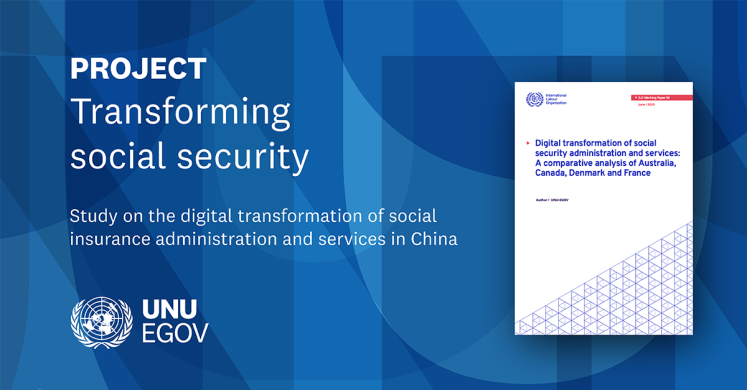With the five-year plan, MOHRSS aims to boost China’s social insurance services and accelerate digital transformation. While China’s social security agencies, from national to local levels, have embraced “Internet + government services,” enhancing efficiency and service quality is key. Digital technology is applied to enhance administration, efficiency, management, communication, and risk prevention, aiming to improve convenience, timeliness, public satisfaction, and sustainable social insurance development. Providing services to over 1.3 billion people, a workforce of 780 million, and employing over 48 million registered companies is no small task – let alone with more than 5,000 social insurance agencies across 32 provinces and regions.
Through the Study on the digital transformation of social insurance administration and services in China, the ILO Office in Beijing, the International Social Security Association (ISSA) and the United Nations University Operating Unit on Policy-Driven Electronic Government (UNU-EGOV) have worked closely with MOHRSS to support an ambition digital agenda in social security.
Three key objectives have been achieved: First, learn from global digital transformation experiences in social security systems to facilitate China’s social insurance digital transformation in line with international best practices. Second, enhance Social Insurance Administration’s ability to provide efficient and robust services for universal coverage in China. Third, contribute to the formulation of the five-year National Action Plan on Digital Human Resources and Social Security Services through the development of a digital service transformation strategy and data governance action plan.
Specifically, the research project involved:
• The analysis of China’s digital social security transformation.
• The analysis and synthesis of global best practices at Australia, Canada, Denmark, France and the European Union level (in English and Chinese), plus a comparative analysis of the digital transformation of social security administration and services in the former four (in English).
• A series of mutual learning events on digital public sector trends and good practices in China and abroad.
• Actively contribute to the development of national digital transformation and data governance strategy and action plan (i.e. the National Action Plan on Digital Human Resources and Social Security Services).
The project and the resulting National Action Plan on Digital Human Resources and Social Security Services), are fully aligned with the objectives of the Overall Layout Plan for the Construction of Digital China, the Guiding Opinions of the State Council on Strengthening the Construction of Digital Government (in Chinese) and the 14th Five-Year Plan (2021-2025). The action plan also contributes to the UN Sustainable Development Goals, particularly ensuring universal coverage, improving access to social security benefits, reducing inequalities, and enhancing well-being across China’s diverse regions. By embracing digital transformation, the aim of the project was to assist in the creation of an inclusive, accessible, and efficient social security system which leaves no one behind.
The research project was part of the EU-China Project “Improving China’s Institutional Capacity towards Universal Social Protection”, implemented by the ILO Beijing Office in collaboration with MOHRSS from 2019 to 2022. The European Union funded this project.



